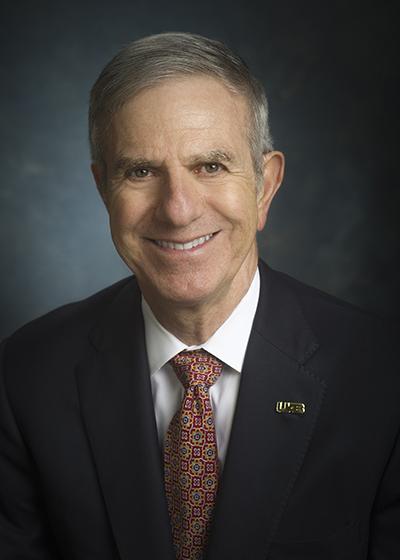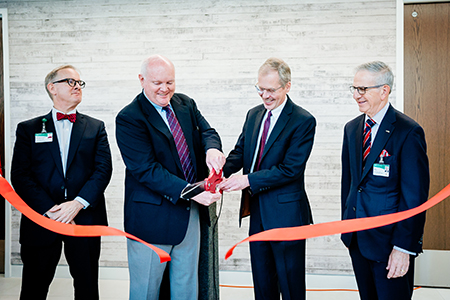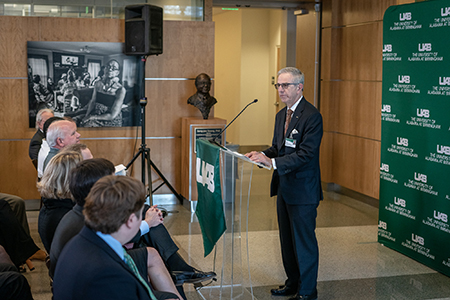Media contact: Tyler Greer
 Will Ferniany, Ph.D.
Will Ferniany, Ph.D.
(Photography: Steve Wood)After nearly 13 years at the helm of the UAB Health System, Will Ferniany, Ph.D., will retire at the end of 2021. Ferniany became chief executive officer of the Health System in 2008, his second stint at UAB. A senior leader in health care since 1975, Ferniany is also the CEO of the new UAB/Ascension St. Vincent’s Alliance. In this role, Ferniany oversees a $5 billion, 11-hospital health system.
Selwyn Vickers, M.D., senior vice president and dean of the UAB School of Medicine, will succeed Ferniany as CEO of UABHS and the Alliance in the new year, while continuing in his role of dean of the medical school.
“Will Ferniany has enjoyed a long and distinguished career that led to transformational change for UAB Medicine and health care in Birmingham and across Alabama,” said UAB President Ray L. Watts. “We are deeply grateful for all of Dr. Ferniany’s contributions to the success of the UAB Health System, the School of Medicine and UAB, and will continue the strong collaborative and aligned leadership team approach that has brought us great success over the last decade. Dr. Ferniany will continue to be actively engaged throughout 2021 in positioning the Alliance for continued success.”
After graduating from the University of Alabama in 1973, Ferniany earned a master’s degree in 1975 and a doctoral degree in 1983 from UAB in health care administration before embarking on a long career in health care management, including serving as associate vice chancellor and chief executive officer of the University of Mississippi Medical Center and vice president/chief administrative officer and senior vice president of Professional Services of the University of Pennsylvania Health System.
He served as CEO of UAB Psychiatric Hospital and executive administrator for the Department of Psychiatry from 1988-1990 and in strategic planning and market development in the UAB Health System from 1990-1992 during this first stint at UAB.
During Ferniany’s tenure as CEO, the UABHS has grown from five hospitals to 11, with revenues expanding from $2.3 billion in 2008 to more than $5.8 billion today. Ferniany says among the most gratifying accomplishments of his time at UAB is the engagement by the Health System to improve health care for Alabamians.
“To that end, UAB is actively engaged with the Alabama Hospital Association, along with many other affiliations with Alabama health care facilities, to expand Medicaid and improve Medicaid funding, develop an extensive telehealth system, and operate the new Alabama Rural Hospital Resource Center,” he said.
Cooperative agreements established with many of the leading health care facilities in the state, including Mobile Infirmary Health and Northeast Regional Medical Center in Anniston, along with the forming of the Alabama Health Alliance with Huntsville Hospital, have contributed to the improvement in health care, and access to health care, in Alabama. UABHS now manages four rural hospitals — in Camden, Demopolis, Greenville and Alexander City — providing cost-savings and efficiencies that help these facilities continue to offer medical care in their communities.
UAB affiliate Medical West Hospital in Bessemer is preparing to start construction on a new, upgraded facility that will improve health care for residents in the South and Southwestern parts of Jefferson County, a project that has been a goal of Ferniany’s for nearly 12 years.
 Ferniany, far right, at the ribbon cutting for Alabama's first proton therapy facility, Proton International at UAB, Jan. 13, 2020. (Photography: Andrea Mabry)Ferniany is well-regarded for the development of a successful Funds Flow model, which provides financial support for clinical departments from health care revenues, aligning the departments and the hospital. Funds Flow provides new revenue streams that support the missions of clinical care, biomedical research and education.
Ferniany, far right, at the ribbon cutting for Alabama's first proton therapy facility, Proton International at UAB, Jan. 13, 2020. (Photography: Andrea Mabry)Ferniany is well-regarded for the development of a successful Funds Flow model, which provides financial support for clinical departments from health care revenues, aligning the departments and the hospital. Funds Flow provides new revenue streams that support the missions of clinical care, biomedical research and education.
“Dr. Ferniany is to be credited for his unwavering support of the mission of academic medicine,” Vickers said. “The Academic Enrichment Fund developed under his leadership aligned the Health System with the academic departments, enhancing the school’s ability to retain and recruit top physicians and scientists.”
Vickers said the school will institute the Will Ferniany Academic Medicine Leadership Award, given to a health system executive who best demonstrates an ongoing commitment to the institution’s academic mission.
Reid Jones, now CEO of UAB Medicine, worked closely with Ferniany over the years as the COO of the Health System.
“Coordinating alignment across the organization was very important to Dr. Ferniany,” said Jones. “He created systems to help senior leadership focus on major projects that would be transformational for UAB. The first was the Bridge to the Future, followed by Organization for
Success. This major reorganization melded our disparate units so that each entity worked in concert with the greater whole. That helped to move us forward.”
Jones says Ferniany’s effort to build the alliance with Ascension St. Vincent’s is another example of forward thinking that will strengthen health care across the state.
“Quality has always been a focal point for Dr. Ferniany,” Jones said. “He is tenacious about producing better outcomes. He cares about his employees, and he cares about the patients. He always says, ‘Do what is right for the patient and everything else falls in place.’”
Ferniany created an Office of Patient Experience and Engagement to measure, support and enable improvements across the organization. Focusing on the patient experience as a strategic priority has resulted in year-over-year improvements in patient satisfaction measures across UAB’s ambulatory clinics. UAB Hospital continues to receive national recognition as a top-performing hospital for patient experience, named in 2020 as a Consumer Loyalty Best in Class Hospital by NRC Health, placing the hospital in the national top 10 for patient experience and brand loyalty for the second consecutive year.
Other initiatives spearheaded by Ferniany addressed promoting leadership and diversity in the Health System, starting with the creation of the position of chief leadership development officer, establishing training courses and scholarship opportunities. The Office of Diversity and Inclusion was created in early 2017. UAB Medicine was named “Best Workplace for Diversity” by Birmingham Magazine in 2018, and held diversity conferences in 2018 and 2019, canceling in 2020 due to COVID-19.
Ferniany is co Ferniany speaks to guests and the media at the naming of the O'Neal Comprehensive Cancer Center, Dec. 4, 2018.mmitted to health equity and established a new position of vice president of Community Health Equity and worked with Jefferson County to establish a University Authority to operate Cooper Green Mercy Health Services. This effort provided support to the county and improved access to high-quality care for Cooper Green patients. UAB Medicine has also supported the Birmingham Education Foundation’s Health Academies, improving access to health professions for students in Birmingham City Schools.
Ferniany speaks to guests and the media at the naming of the O'Neal Comprehensive Cancer Center, Dec. 4, 2018.mmitted to health equity and established a new position of vice president of Community Health Equity and worked with Jefferson County to establish a University Authority to operate Cooper Green Mercy Health Services. This effort provided support to the county and improved access to high-quality care for Cooper Green patients. UAB Medicine has also supported the Birmingham Education Foundation’s Health Academies, improving access to health professions for students in Birmingham City Schools.
The Health System’s response to the COVID-19 pandemic is also a testament to Ferniany’s vision of supporting the community and the state. UAB Medicine rapidly set up testing sites for the virus and developed new testing methods. When vaccines became available, UAB created vaccine sites to serve all of Jefferson County and UAB’s patients at Parker High School, the Hoover Met, UAB Hospital-Highlands and AOH Cathedral of the Cross church. UAB has administered more than 105,000 vaccines at its vaccine locations to date.
“I am proud of what our faculty and staff have accomplished in operating these sites,” Ferniany said. “Vaccination is the key to ending the pandemic and bringing about a return to normalcy. We accepted the responsibility, as we are one of the few organizations with the resources, the expertise and the opportunity to maintain these large-scale vaccination sites.”
Ferniany has served on many regional and national health administration boards, including the Alabama Hospital Association (past chair), Association of American Medical Colleges, University Health Consortium, Council of Teaching Hospitals (past chair), Vizient and the University of Miami Health System.
“It has been my honor and privilege to serve UAB Health System’s patients, physicians and employees, and the people of Alabama,” Ferniany said. “The UAB Health System and the UAB Health System/Ascension St. Vincent’s Alliance will continue to improve health care delivery in Birmingham and across Alabama. While it is bittersweet to announce my retirement, I do so with great pride in all we have accomplished together for those we serve and knowing the future of continued success is in good hands. UAB will never fail as long as we do what is right for our patients, our community and our state.”